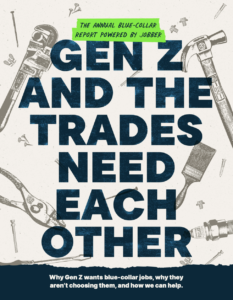
Report highlights Gen Z’s perceived obstacles and sentiments toward blue-collar careers
August 2, 2024 | By HPAC Magazine
76 per cent of those surveyed agreed there is a stigma associated in choosing vocational school over traditional four-year universities.

Despite a perceived stigma and lack of education around the the trades, Gen Z’s sentiment toward white-collar careers appears to be wavering, the report showed.
A report has been released by Jobber surveying 1,000 American students aged 18 to 20 to reveal their insights regarding education, career choices, and how blue-collar careers factor into those considerations.
The Annual Blue-Collar Report: Gen Z and the Trades Need Each Other shows that 76 per cent of those surveyed agree that there is a stigma associated with choosing vocational school over a traditional four-year university program.
Only 17 per cent of respondents claimed to have received education and information surrounding the benefits of vocational training, compared to 66 per cent having received education on the benefits of a four-year bachelor’s degree.
The data shows this stigma to largely be informed by the depiction of this career path by media and parental figures: 47 per cent said that trade professionals largely receive a negative portrayal in TV and movies, with 83 per cent believing that trade professionals are not portrayed with a strong sense of accomplishment compared to white-collar professionals.
Family was identified as the largest factor on Gen Z’s career choices at 51 per cent, with 68 per cent of respondents planning to pursue a white-collar career and the majority citing parental influence as informing these choices.
“While there is some renewed interest among the younger generation to pursue blue-collar careers, there’s still far too much work homeowners need done, and not enough workers to do it,” said Jobber CEO Sam Pillar. “We need to do a better job showing Gen Z how incredible the opportunities in the trades are, and encouraging them to consider that path.”
Despite this perceived stigma and lack of education around the opportunities presented by the trades, the survey also showed Gen Z’s sentiment toward the trajectory presented by white-collar careers to be wavering.
One third of respondents see white-collar desk jobs as less stable than they were for their parents’ generation, with nearly half agreeing that the potential for AI to replace jobs has made it more difficult to achieve the “American Dream” (41 per cent) and that there will be fewer future opportunities as a result (46 per cent).
In describing what would make a blue-collar career path more appealing, many of the qualities outlined by Gen Z are already offered by the trades: flexible work hours (73 per cent), job stability (61 per cent) and overtime pay (58 per cent).
The report also highlights 10 specific calls to action aimed at the general public, blue-collar professionals, policymakers, educators and the media for bridging the gap between Gen Z’s career anxieties and the blue-collar opportunities that lie ahead.



